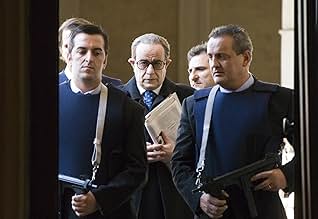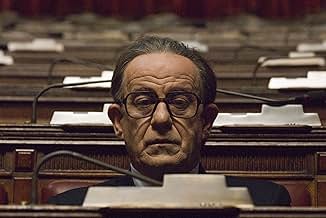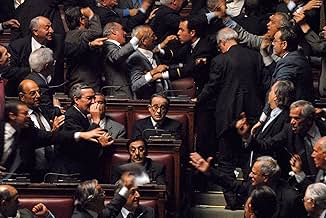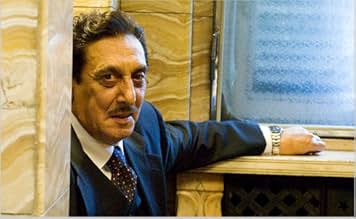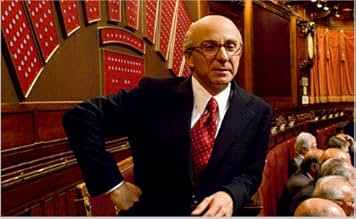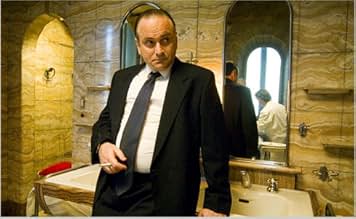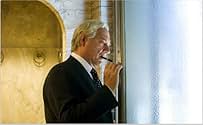IMDb-BEWERTUNG
7,2/10
19.838
IHRE BEWERTUNG
Die Geschichte des italienischen Politikers Giulio Andreotti, der seit der Wiederherstellung der Demokratie im Jahr 1946 siebenmal das Amt des Ministerpräsidenten von Italien bekleidete.Die Geschichte des italienischen Politikers Giulio Andreotti, der seit der Wiederherstellung der Demokratie im Jahr 1946 siebenmal das Amt des Ministerpräsidenten von Italien bekleidete.Die Geschichte des italienischen Politikers Giulio Andreotti, der seit der Wiederherstellung der Demokratie im Jahr 1946 siebenmal das Amt des Ministerpräsidenten von Italien bekleidete.
- Für 1 Oscar nominiert
- 32 Gewinne & 40 Nominierungen insgesamt
Empfohlene Bewertungen
This is a film of two parts - something which a previous comment didn't really make clear - we see the events of Italy during Andreotti's reign in the first half from Andreoti's point of view: then in the second half we see the same events again from (depending on your perspective) either a more dispassionate or a more disparaging observation.
As a bit of cinema it is brilliant (one or two IMO rather silly unslick bits of special FX, just ignore them!) but altogether not to be missed. I doubt that it will translate well, and even for a seasoned appassionato of Italian politics the introduction of characters using (clever) superimposed text was flawed by the overshort screen time which these important notes were allowed.
As a bit of cinema it is brilliant (one or two IMO rather silly unslick bits of special FX, just ignore them!) but altogether not to be missed. I doubt that it will translate well, and even for a seasoned appassionato of Italian politics the introduction of characters using (clever) superimposed text was flawed by the overshort screen time which these important notes were allowed.
Biographical films tend to be respectful to the historical figures that they describe. Even when they describe complex and controversial characters they try to explain and to put in context the motivation of deeds which in the perspective of history seem evil. Paolo Sorrentino's 'Il Divo' is quite the contrary, it is a negative biography about a character who dominated the Italian politics for most of the second part of the 20th century, the leader of the Christian-Democratic Party and seven-times Prime Minister of Italy, Giulio Andreotti. The film does not lack complexity - quite the contrary - and the historical context of the 80s and 90s is described in detail, but the effect is willingly opposite than in usual biographies. Even political actions which would have seen candid or neutral seem to catch a strong significance and are seen through the perspective of the corruption and Mafia-relations which seem to have dominated Italian political life of the period.
My knowledge about the Italian politics is too superficial to make a definite judgment about the correctness of the facts presented on screen. What I can say after seeing the film is that it does not seem to pretend to be objective. Even if there is no explicit statement, there is neither any positive angle we brought into the film or positive dimension that is not questioned. Even the relationship with his wife ('I knew all these years what kind of man I married') or helping the poor (which looks more like a political exercise deprived of sincerity). There are however many other scenes (like the repeated walk on empty streets surrounded by cohorts of security people, the reception after his last nomination as Prime Minister) which describe not only the outer-worldness of the man, but also of the whole system.
Even more amazing is the fact that Andreotti was alive when this film was made (he actually died about a month ago) and has seen at least part of the film, allegedly walking out after a while. So this is not only a biography, but a pamphlet directed against a living politician. Andreotti, by the way, was no stranger to the Italian cinema industry, he played an important role in establishing the rules that protected the local industry against foreign (especially Hollywood) imports in the 50s, but also the establishment of a de-facto censorship over the content of the productions which was in place for many decades. Is this film also kind of a revenge of the now free industry over this character? Maybe.
To a very large extent 'Il DIvo' relies on the extraordinary acting performance of Toni Servillo. He makes one of these creations which in time tend to superpose and replace the visual representation we have about the real-life person. Great acting indeed, but do we end by understanding better Giulio Andreotti the man? I doubt it. Paolo Sorrentino certainly knows how to construct complex characters which do not show easily their intense internal beings. Looking now retrospectively he did the same thing in This Must Be the Place (which he made later, but I saw it before). He does not however serve the viewers with ready prepared answers about the motivation of his heroes. I knew very little about Andreotti before seeing this film, I know many more facts now, but the man remains a mystery.
My knowledge about the Italian politics is too superficial to make a definite judgment about the correctness of the facts presented on screen. What I can say after seeing the film is that it does not seem to pretend to be objective. Even if there is no explicit statement, there is neither any positive angle we brought into the film or positive dimension that is not questioned. Even the relationship with his wife ('I knew all these years what kind of man I married') or helping the poor (which looks more like a political exercise deprived of sincerity). There are however many other scenes (like the repeated walk on empty streets surrounded by cohorts of security people, the reception after his last nomination as Prime Minister) which describe not only the outer-worldness of the man, but also of the whole system.
Even more amazing is the fact that Andreotti was alive when this film was made (he actually died about a month ago) and has seen at least part of the film, allegedly walking out after a while. So this is not only a biography, but a pamphlet directed against a living politician. Andreotti, by the way, was no stranger to the Italian cinema industry, he played an important role in establishing the rules that protected the local industry against foreign (especially Hollywood) imports in the 50s, but also the establishment of a de-facto censorship over the content of the productions which was in place for many decades. Is this film also kind of a revenge of the now free industry over this character? Maybe.
To a very large extent 'Il DIvo' relies on the extraordinary acting performance of Toni Servillo. He makes one of these creations which in time tend to superpose and replace the visual representation we have about the real-life person. Great acting indeed, but do we end by understanding better Giulio Andreotti the man? I doubt it. Paolo Sorrentino certainly knows how to construct complex characters which do not show easily their intense internal beings. Looking now retrospectively he did the same thing in This Must Be the Place (which he made later, but I saw it before). He does not however serve the viewers with ready prepared answers about the motivation of his heroes. I knew very little about Andreotti before seeing this film, I know many more facts now, but the man remains a mystery.
I've heard several American viewers complain that this film is all style over substance. I couldn't disagree more.
I think that if a viewer is familiar with Italian Political History then this film comes off as absolutely breathtaking, and not just for its amazing filmic style. For one, the performances and interpretations of these real characters are spot on and for another the intelligence and courage to which the script approaches the ethical implications of Il Divo's actions, the breadth of moral exploration, how he defends himself to himself, to others and, often, directly to the viewer, is a welcomed shock and dose of complexity to the often polemic and overly-reductive discourse in Italian politics (not much different than here in the States in that regard). Lastly, for Italians, these events resonate incredibly and speak very much to the current power base in Italy. I truly feel that a lot of Americans are watching this film with cultural blinders on.
I won't lie, it is definitely designed for people that already have a strong grasp of the history. It doesn't weigh itself down with long explanations and exposition (except in text at the beginning and end of the film) so if you're coming to this to learn every sordid detail about its subject, or for a plot, even, then you might not find much reward in it. But as an exercise in unpacking a very complicated subject with real style, it's amazing!
I think that if a viewer is familiar with Italian Political History then this film comes off as absolutely breathtaking, and not just for its amazing filmic style. For one, the performances and interpretations of these real characters are spot on and for another the intelligence and courage to which the script approaches the ethical implications of Il Divo's actions, the breadth of moral exploration, how he defends himself to himself, to others and, often, directly to the viewer, is a welcomed shock and dose of complexity to the often polemic and overly-reductive discourse in Italian politics (not much different than here in the States in that regard). Lastly, for Italians, these events resonate incredibly and speak very much to the current power base in Italy. I truly feel that a lot of Americans are watching this film with cultural blinders on.
I won't lie, it is definitely designed for people that already have a strong grasp of the history. It doesn't weigh itself down with long explanations and exposition (except in text at the beginning and end of the film) so if you're coming to this to learn every sordid detail about its subject, or for a plot, even, then you might not find much reward in it. But as an exercise in unpacking a very complicated subject with real style, it's amazing!
A film to admire but impossible to love. Not an ounce of humanity to cling on to. Splendidly put together but only with the intellect so, for non Italians a puzzle that seems like a figment of someone's imagination and to be taken as a sort of intellectual metaphor. How can a creature from hell in good terms with the Catholic Church can survive all this years and when I say survive I mean survive from every possible angle. Italians know that is not only true but normal. I'm half Italian so I know what I'm talking about. Andreotti is played by Paolo Servillo in a performance that is part caricature, part faithful portrait, a work of genius and I suspect that the slightly surreal, grotesque undertones, allowed the movie to be made and succeed in the way it did, at least in Italy. I saw it in New York where I was the only spectator in the theater. I can't wait to see where director Sorrentino will take us next.
Il Divo, which won the Jury Prize at Cannes last year and has recently been released in US movie houses, is a devastatingly ironic and highly stylized portrait of the strange, extraordinarily powerful and long-lived Italian politician Giulio Andreotti. He has been in Italian government in some office or other since the late 1940's. After slipping out of repeated convictions for Mafia ties in the past decade he remains "senator for life" at the age of 90, and he's been credited with helping bring down governments even quite recently.
The ultimate political survivor, Andreotti was seven times prime minister from 1972 to 1992. He's had a seat in the Italian parliament without interruption since 1946, and has also been Defense Minister, Foreign Minister, and President. In Andreotti's own view (though he walked out on the film) his wife of 60 years Livia (Anna Bonaiuto) and his long-serving secretary Vincenza Enea (Piera Degli Esposti), are both sympathetically portrayed in Il Divo. He really didn't like being shown kissing Mafia boss Toto Riina, which he has said never happened. In the film, Andreotti is most haunted by the Red Brigades' murder of the kidnapped of Aldo Moro, which he might have prevented.
Though Sorrentino's film is in some ways a detailed chronicle of Anreotti's 60-plus years of political power and dubious dealings, with a focus on the seventh government and its aftermath, the film seems more an exercise in style than an impassioned study of politics. The self-consciousness of its frequent uses of loud contrasting music, ceremonial, almost Kabuuki-like set pieces, and slow-motion to muffle scenes of violence are further underlined by the performance of Toni Servillo, who accurately, perhaps too accuately, mimics Andreotti's look, his hunched posture, even his oddly turned-down ears, and his puppet-like mannerisms. Staring forward, neck rigid, he keeps his arms close to his body and his hands turned inward and peers expressionlessly out of his big eyeglasses. He walks across the floor in quick tiny steps like some 18th-century Japanese court lady. There is no attempt by director or principal actor to charm or to involve. It seems Sorrentino, with Servillo's diligent collaboration, is laughing not only at Andreotti and at Italian politics, but at us.
Il Divo is soulless and cynical, but it is so stylish that it's bound to be remembered. It's some kind of ultimate statement of the essence of the slick, heavily-guarded world of Italian political corruption. In its own special, magisterially mean-spirited and pessimistic way it's an instant classic.
In this film, Andreotti, who has been referred to as "Il divo Giulio" ("The God Giulio," referencing the Roman Empire's deification of Julius Caesar), and by monikers like "Beelzebub," "The Fox," "The Black Pope," "The Prince of Darkness," and "The Hunchback," is a queer, nerdy, mummified-looking creature who hardly ever changes expression or cracks a smile. His rigid gestures and the odd commentary of his group of primary supporters, themselves all provided with gangster-style nicknames, lead to a series of scenes that suggest politics as caricatural facade, as almost pure ritual, with time out on occasion for jokes, self-pity, and cruelty to others. You won't hear constituents mentioned in this movie, though when somebody says another politician prays to God but he prays to the priest, Andreotti answers: "Priests vote. God doesn't." Politics is everything to him, and politics means the pursuit of power.
For a non-Italian the details of various moments from the Aldo Moro kidnapping and all the terrorism of the Brigate Rosse of the 1970's to the 1990 Mafia trials may be pretty confusing. It's not that the filmmakers don't care; they're primarily talking to an Italian audience. But even for such an audience, they're keeping an ironic distance.
The facade never cracks. In one scene, typically staring straight forward, Andreotti delivers an impassioned speech of self-defense, raising his voice almost to a shout at the end, but without moving a muscle of his face. Servillo is a noted man of the theater in Italy and his whole performance is a chilly tour de force that inspires awe without giving much pleasure. Andreotti in this soliloquy--which highlights the film's often solipsistic feel--argues that a leader must manipulate evil in order to maintain good. This may fit in with the evidence that he collaborated with the Mafia, and yet at times was severe in repressing it.
In life as in this film Andreotti has compensated for what may be the lack of visible humanity by being a wit, and Il Divo crams as many of the famous battute or one-lineers into scenes as it can. One was "the trouble with the Pope is that he doesn't know the Vatican." Another: "They blame me for everything, except the Punic wars." "Signor Andreotti, how do you keep your conscience clean?" he was once asked. "I never use it," he replied. Other bons mots among many: "The trouble with the Red Brigades is they're too serious," and "Power is fatiguing only to those who don't have it." The world of Italian politics is baffling to the outsider. Andreotti's cool detachment and wit and this film's stylized cynicism may be the best approach to its deviousness and complexity.
Last year Servillo also played one of the main characters in Matteo Garrone's Gomorrah, where he's an out-and-out Mafia functionary. Gomorrah won Cannes' number-two award (just below the Golden Palm) the Grand Prize, last year, which given Il Divo's Jury Prize prompted declarations of a rebirth of Italian cinema in the making. Non-Italians like Mafia movies; Italians are sick of them, and might have wished for patriotic reasons that their best filmmakers had won applause by turning to some other subject matter. Both these films are cold, detached, and analytical. Maybe they mean Italians are getting serious about their own film industry and want to look the country's ugliest aspects right in the eye. But don't look for hope here. A great cinema requires more humanity than this.
The ultimate political survivor, Andreotti was seven times prime minister from 1972 to 1992. He's had a seat in the Italian parliament without interruption since 1946, and has also been Defense Minister, Foreign Minister, and President. In Andreotti's own view (though he walked out on the film) his wife of 60 years Livia (Anna Bonaiuto) and his long-serving secretary Vincenza Enea (Piera Degli Esposti), are both sympathetically portrayed in Il Divo. He really didn't like being shown kissing Mafia boss Toto Riina, which he has said never happened. In the film, Andreotti is most haunted by the Red Brigades' murder of the kidnapped of Aldo Moro, which he might have prevented.
Though Sorrentino's film is in some ways a detailed chronicle of Anreotti's 60-plus years of political power and dubious dealings, with a focus on the seventh government and its aftermath, the film seems more an exercise in style than an impassioned study of politics. The self-consciousness of its frequent uses of loud contrasting music, ceremonial, almost Kabuuki-like set pieces, and slow-motion to muffle scenes of violence are further underlined by the performance of Toni Servillo, who accurately, perhaps too accuately, mimics Andreotti's look, his hunched posture, even his oddly turned-down ears, and his puppet-like mannerisms. Staring forward, neck rigid, he keeps his arms close to his body and his hands turned inward and peers expressionlessly out of his big eyeglasses. He walks across the floor in quick tiny steps like some 18th-century Japanese court lady. There is no attempt by director or principal actor to charm or to involve. It seems Sorrentino, with Servillo's diligent collaboration, is laughing not only at Andreotti and at Italian politics, but at us.
Il Divo is soulless and cynical, but it is so stylish that it's bound to be remembered. It's some kind of ultimate statement of the essence of the slick, heavily-guarded world of Italian political corruption. In its own special, magisterially mean-spirited and pessimistic way it's an instant classic.
In this film, Andreotti, who has been referred to as "Il divo Giulio" ("The God Giulio," referencing the Roman Empire's deification of Julius Caesar), and by monikers like "Beelzebub," "The Fox," "The Black Pope," "The Prince of Darkness," and "The Hunchback," is a queer, nerdy, mummified-looking creature who hardly ever changes expression or cracks a smile. His rigid gestures and the odd commentary of his group of primary supporters, themselves all provided with gangster-style nicknames, lead to a series of scenes that suggest politics as caricatural facade, as almost pure ritual, with time out on occasion for jokes, self-pity, and cruelty to others. You won't hear constituents mentioned in this movie, though when somebody says another politician prays to God but he prays to the priest, Andreotti answers: "Priests vote. God doesn't." Politics is everything to him, and politics means the pursuit of power.
For a non-Italian the details of various moments from the Aldo Moro kidnapping and all the terrorism of the Brigate Rosse of the 1970's to the 1990 Mafia trials may be pretty confusing. It's not that the filmmakers don't care; they're primarily talking to an Italian audience. But even for such an audience, they're keeping an ironic distance.
The facade never cracks. In one scene, typically staring straight forward, Andreotti delivers an impassioned speech of self-defense, raising his voice almost to a shout at the end, but without moving a muscle of his face. Servillo is a noted man of the theater in Italy and his whole performance is a chilly tour de force that inspires awe without giving much pleasure. Andreotti in this soliloquy--which highlights the film's often solipsistic feel--argues that a leader must manipulate evil in order to maintain good. This may fit in with the evidence that he collaborated with the Mafia, and yet at times was severe in repressing it.
In life as in this film Andreotti has compensated for what may be the lack of visible humanity by being a wit, and Il Divo crams as many of the famous battute or one-lineers into scenes as it can. One was "the trouble with the Pope is that he doesn't know the Vatican." Another: "They blame me for everything, except the Punic wars." "Signor Andreotti, how do you keep your conscience clean?" he was once asked. "I never use it," he replied. Other bons mots among many: "The trouble with the Red Brigades is they're too serious," and "Power is fatiguing only to those who don't have it." The world of Italian politics is baffling to the outsider. Andreotti's cool detachment and wit and this film's stylized cynicism may be the best approach to its deviousness and complexity.
Last year Servillo also played one of the main characters in Matteo Garrone's Gomorrah, where he's an out-and-out Mafia functionary. Gomorrah won Cannes' number-two award (just below the Golden Palm) the Grand Prize, last year, which given Il Divo's Jury Prize prompted declarations of a rebirth of Italian cinema in the making. Non-Italians like Mafia movies; Italians are sick of them, and might have wished for patriotic reasons that their best filmmakers had won applause by turning to some other subject matter. Both these films are cold, detached, and analytical. Maybe they mean Italians are getting serious about their own film industry and want to look the country's ugliest aspects right in the eye. But don't look for hope here. A great cinema requires more humanity than this.
Wusstest du schon
- WissenswertesThe first cut of the movie was 145-minute long.
- Zitate
Giulio Andreotti: I know I am an average man but looking around I do not see any giant.
- Crazy CreditsEnd credits features the following dedication: "per Daniela, che mi ha salvato" ("for Daniela, who saved me"). Daniela D'Antonio is Paolo Sorrentino's wife.
- VerbindungenFeatured in The 82nd Annual Academy Awards (2010)
- SoundtracksLa prima cosa bella
Written by Mogol, Gian Piero Reverberi and Nicola Di Bari
Performed by Ricchi e Poveri
Published by Universal Music Publishing Ricordi S.r.l.
Courtesy of EMi Music Italy S.p.a.
Top-Auswahl
Melde dich zum Bewerten an und greife auf die Watchlist für personalisierte Empfehlungen zu.
- How long is Il Divo?Powered by Alexa
Details
Box Office
- Budget
- 5.700.000 € (geschätzt)
- Bruttoertrag in den USA und Kanada
- 240.159 $
- Eröffnungswochenende in den USA und in Kanada
- 13.867 $
- 26. Apr. 2009
- Weltweiter Bruttoertrag
- 11.260.366 $
- Laufzeit1 Stunde 50 Minuten
- Farbe
- Sound-Mix
- Seitenverhältnis
- 2.35 : 1
Zu dieser Seite beitragen
Bearbeitung vorschlagen oder fehlenden Inhalt hinzufügen

Oberste Lücke
By what name was Il Divo - Der Göttliche (2008) officially released in India in English?
Antwort

